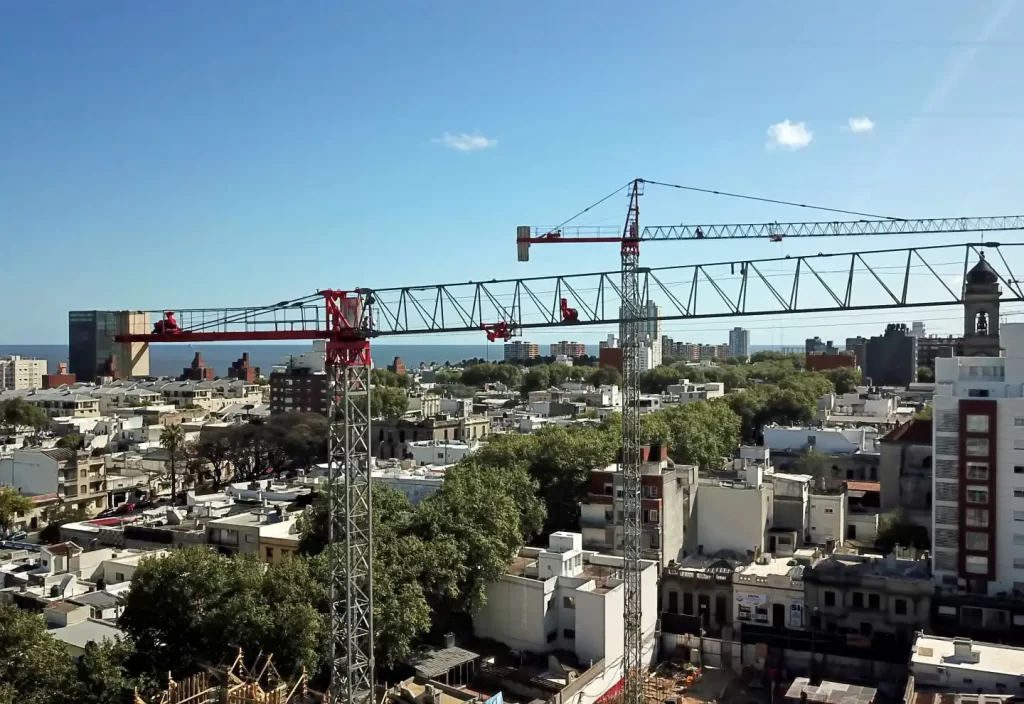Uruguay has all the conditions to become a real estate investment hub in South America, but this goal requires concrete policies and coordinated efforts.

Cranes in Montevideo. Photo: Estefanía Leal.
Uruguay’s Potential as a Hub for Foreign Investors in the Real Estate Market
Uruguay has all the conditions to become a real estate investment hub in South America, thanks to its political, economic, and social stability. However, this goal has not yet materialized and requires concrete policies and coordinated efforts. This article explores how Uruguay can attract foreign investment, reduce housing demand, and energize the real estate market, with a focus on promoted housing, rentals, and multifamily developments.
Promoted Housing: A Proposal to Extend Tax Exemptions
Promoted housing has been a successful model in Uruguay, allowing thousands of families to access decent housing. However, to continue driving this sector, it has been proposed to extend the tax exemptions for 20 years, though under certain conditions and in specific areas.
Conditions and Strategic Areas: The extension of the tax exemptions would be subject to criteria such as the location of the projects (prioritizing areas with greater housing shortages) and adherence to quality and sustainability standards. These projects must be based in the interior of the country. Potential Impact: According to estimates, this measure could generate an investment of one billion dollars and the construction of 100 new buildings, or their equivalent in houses, which would help reduce housing shortages and create jobs. Attractive Profitability: Promoted housing already offers an annual return of 7.7%, making it an interesting option for local and foreign investors.
Rentals: A Solution for Access to Housing
The rental market is booming in Uruguay, especially in a context where mortgage loans are difficult to access for many end users due to the high cost of monthly payments. Rentals are emerging as a viable alternative to meet housing demand.
Need in the Interior: All areas outside Montevideo require housing, particularly for rent, due to the lack of access to affordable mortgage loans. Capital cities of the departments are seeing growing demand for rental housing, presenting an opportunity for investors. Profitability in Punta del Este: Although the price per square meter in Punta del Este is lower than in Montevideo, the profitability from rentals is significant, especially for properties intended for tourists and temporary residents.
Multifamily: An Emerging Opportunity
The multifamily segment (apartment buildings and residential complexes) is gaining ground in Uruguay, particularly in the interior of the country. This model is ideal for addressing rental housing demand and reducing the housing deficit.
Regional Economic Growth: The development of sectors such as agriculture, logistics, and services in the interior has generated employment and attracted new residents, increasing the demand for housing. Lower Costs: Compared to Montevideo, the construction costs and land acquisition costs in the interior are significantly lower, increasing profitability potential.
Proposal: Create a Commission to Attract Foreign Investors
To consolidate Uruguay as an attractive destination for real estate investment, it is proposed to create a commission or specialized department to attract foreign investors. This entity would aim to:
International Promotion: Conduct promotional campaigns in key markets such as Argentina, Brazil, Spain, and the United States, highlighting Uruguay’s competitive advantages. China should also be considered as an investor-capturing option. Simplification of Procedures: Work on reducing bureaucracy and speeding up the permit and licensing processes to facilitate investment. Personalized Advice: Offer advice to foreign investors on investment opportunities, tax incentives, and local regulations. Clear Regulations: With clear and stable current regulations, trust is generated among foreign investors.
Challenges and Opportunities
Although Uruguay has great potential, it also faces challenges that need to be addressed to attract foreign investment:
Lack of Access to Credit: The high cost of mortgage payments limits access to housing for many Uruguayans, increasing demand for rentals and multifamily projects. Infrastructure in the Interior: Improving infrastructure in the interior of the country is crucial to supporting the growth of real estate projects and attracting more residents.
Conclusion: A Promising Future, But Work to Be Done
Uruguay has all the conditions to become a real estate investment hub in South America, but this goal requires concrete policies and coordinated efforts. Extending the tax exemptions for promoted housing for 20 years, fostering rentals, and developing multifamily projects are key steps to reduce housing demand and energize the market. Additionally, creating a specialized commission to attract foreign investors could provide a decisive push to reach this goal.
The future of Uruguay’s real estate market is promising, but it depends on effective collaboration between the government, the private sector, and civil society.
— Gonzalo Martínez Vargas, Guest Columnist, CEO of Moebius, a consulting firm specializing in the real estate sector.
Source: El País | https://www.elpais.com.uy/
At Nicolás de Módena Inmobiliaria, we are your ally in the Punta del Este real estate market. With a successful track record in property sales and exclusive rentals, we are recognized as one of the best real estate agencies in the area. If you want to find the perfect property or make a secure investment, contact us!
– Phone: (+598) 42 47 93 36 // (+598) 99 815 537
– Website: www.nicolasdemodena.com
